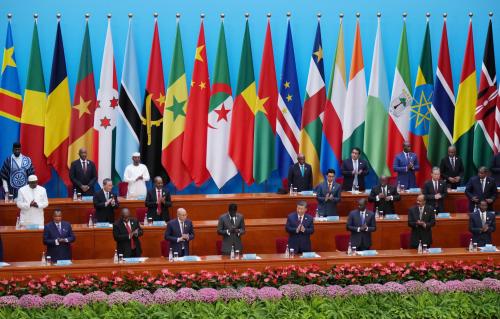A year ago, British Prime Minister Gordon Brown chaired the London G-20 Summit amidst growing concerns about the on-going financial and economic crisis. Three major achievements resulted from this summit, which convened twenty diverse countries rather than eight essentially transatlantic countries.
First, as a result of the process of concertation, communication and coordination in the run-up to the April 2009 London Summit, the G-20 countries together provided $5 trillion in stimulus to the world economy, an unprecedented combined jolt to precipitously dropping global demand.
Second, the International Monetary Fund was brought to center stage again as the world’s principal lender of last resort with pledges of $1 trillion dollars in additional resources from G-20 countries and promises to strengthen its role in global finance and reform its governance.
Third, G-20 governments committed themselves to strengthening national and global institutions for oversight, supervision and regulation of financial markets and institutions, at the same time they transformed the highly transatlantic-centric Financial Stability Forum in Basel composed of financial authorities into a new Financial Stability Board with greater authority and with all G-20 now present as full members.
Only a year later, the London Summit looks to have been an enormous success in stopping the drop in the global economy, in strengthening the financial and institutional capacity of the international community to address future crises, and in pushing for national and global financial regulatory reform. Our prediction would be that in coming years, the London G-20 Summit will be seen as the most successful summit in history, eclipsing the G8.
What looms largest in the rear view mirror even now is the $5 trillion combined stimulus by G-20 countries. This action, along with expansionary monetary policies in G-20 countries, was the major reason for the bottoming-out of the Great Recession of 2008-2009 and the beginnings of recovery around the world. But it did not seem to be so in the eyes of the beholders of summitry a year ago. The big headline out of the London G-20 Summit was not the combined stimulus of $5 trillion dollars but the additional resources for the IMF of $1 trillion.
Why was the focus a year ago on the $1 trillion for the IMF rather than on the $5 trillion for the world economy? Because there was a huge spat between the US and UK on one side and the continental Europeans on the other in the weeks before 2 April 2009 about what constituted additional fiscal stimulus. The US-UK argument was that only additional discretionary fiscal stimulus should count, and that “automatic stabilizers”, built-in social programs like unemployment compensation, should not be counted because they were not deliberate, incremental actions but systemic responses not requiring policy decision.
In the end, this was a false debate and a lesson to be learned for the future. IMF figures prepared for the March 2009 G-20 finance ministers meeting revealed that if discretionary fiscal stimulus actions and systemic automatic stabilizer expenditures were combined, the total impact of all G-20 countries would be at an average annual rate of 2.6 percent of 2007 GDP for 2008-2010. This was well above the 2 percent of GDP fiscal stimulus target set out by the IMF before the London Summit a year ago.
There was no economic reason whatsoever for distinguishing between discretionary fiscal stimulus of expenditure increases and tax cuts on the one hand and unemployment compensation and systemic social expenditures triggered by economic downturns, on the other. Both add to aggregate demand. And both did, which is the fundamental reason why the London Summit can already be seen to be such a success even though it was not seen to be so in its immediate aftermath.
In fact, we know now that the reason why the $1 trillion for the IMF trumped the $5 trillion for the world economy as the headline a year ago was precisely because there was such a open public conflict over what counted as fiscal stimulus and because many of the stimulus decisions were taken over time rather than at the time of the summit itself. This myopia over definitional detail and focusing on coordination at a given event rather than concertation over time was fallacious and in terms of the economics of it, wrong on both counts.
Two culprits seem to stand out for this misperception of reality. First, leaders and finance ministers should not have indulged themselves in a public quarrel over definitions when any sensible person would realize that, systemic differences aside, expenditure injections are expansionary whether they are automatic or discretionary. Second, the financial press had a field day with the debate, featuring it on the front pages as a cock fight in a farm yard rather than calling it out as a false debate.
Neither leaders nor the press seemed aware of the fact that the public was looking to the London Summit for leadership and the exertion of public responsibility over global economic outcomes. G-20 leaders in London last year actually did that in three very significant realms but the message was garbled and the public’s vision was blurred by a useless debate that deflected attention away from the principal action and the main message from London a year ago. In the end, $5 trillion is greater than $1 trillion in both scale and effect.
The Brookings Institution is committed to quality, independence, and impact.
We are supported by a diverse array of funders. In line with our values and policies, each Brookings publication represents the sole views of its author(s).



Commentary
Op-edThe April 2009 London G-20 Summit in Retrospect
April 5, 2010